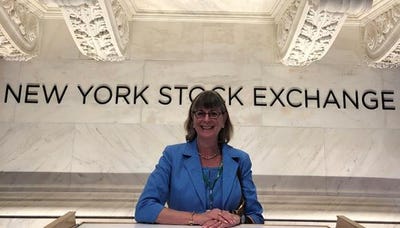Third Quarter Review — Waste and Recycling Trending as Expected
Over the past two weeks, the publicly-traded solid waste companies reported their third-quarter earnings and held follow-up conference calls. In this edition of the Business Report, we review the trends revealed, and call out the few differences in the industry.

Over the past two weeks, the publicly-traded solid waste companies reported their third-quarter earnings and held follow-up conference calls. In this edition of the Business Report, we review the trends revealed, and call out the few differences in the industry.
Price Growth Remains Strong; Volume Stabilizes
Price growth moderated sequentially, along with underlying inflation, and did not surprise to the upside as it had earlier this year. However, across the board, pricing remained at historically high levels and was generally regarded as in line with expectations. Additionally, there was less focus on absolute price levels but rather on the “price/cost spread”—in other words, the difference between core price and the companies’ underlying cost inflation. Cost inflation was most typically cited to be down to the mid-single-digits percentage level, down from either high single digit or even double digit at the beginning of the year. Thus, even as absolute pricing growth has come down, underlying cost inflation has come down faster, and WM (WM) and Casella Waste (CWST) both called out 100 basis point price/cost spreads. GFL Environmental (GFL) and Waste Connections (WCN) continued to lead the pack in absolute core price levels–at 8.8% for both companies.
After second quarter reports and conference calls, wherein company management teams either called out pockets of weakness or had surprisingly negative volume numbers, in the third quarter volumes seemed to stabilize. WM and Republic Services (RSG) had modestly positive volume numbers, and WM posted a slight uptick from second quarter levels as special waste improved. Both companies noted some weakness in roll off, but importantly, commercial volumes for both were positive, with net new business and net service intervals also remaining positive. GFL and WCN volumes remained negative, but when adjusted, did not materially worsen from second quarter levels. CWST’s more notably negative volume (-3.3%) was impacted by a 35% falloff in special waste. GFL, WCN, and CWST all emphasized that the shedding of unprofitable work was a major factor in their negative volumes, particularly after several years of outsized acquisition activity and the unprofitable work that came with it. Excluding the noise, the underlying solid waste environment was largely characterized as flattish.
Recycled Commodity and Renewable Energy Pricing Improved
Recycled commodity prices remained substantially down on a year-over-year basis, but old corrugated cardboard (OCC) continued to improve sequentially. That, combined with structural changes in recycling contracts and automation efforts, has lessened recycling’s negative margin and earnings impacts. Recycling operations generally performed largely as anticipated. Given continued fiber strength in October, and hopefully a bottom in recycled plastics in late summer, recycling is expected to flip from a headwind to a tailwind in the fourth quarter and into 2024. Renewable energy (RIN) pricing popped materially in the third quarter, and thus, the third quarter average was around $3, which largely neutralized the negative impact it had been earlier in the year. As a result, RIN’s pricing is also expected to be a tailwind heading into 2024.
EBITDA Results Largely in Line; Margins Strengthen and 2023 Guidance Generally Reaffirmed
Also across the board, EBITDA results were in line to a modest positive, though revenue results were slightly more mixed, though again, not materially off. EBITDA margins inflected positively and were also an upside surprise in almost all cases, given the strong pricing and more muted recycling and renewable energy impacts. Importantly, underlying solid waste margins (stripping out ancillary businesses and commodity impacts) were very strong, up anywhere from 70 basis points for WM to more than 300 basis points for GFL, again entirely due to the positive price/cost spread.
As a result, and also as expected, full year 2023 guidance (particularly for EBITDA) was reaffirmed at all the companies, and only raised modestly at CWST due to the completion of the sizable Twin Bridges acquisition. That said, in an otherwise uneventful quarterly reporting season, WCN produced some fireworks. Although WCN’s third quarter results were right in line with expectations and 2023 guidance was reaffirmed, WCN’s quarter had $15 million of unusual expenses—a $9 million risk adjustment and $6 million in expenses from two landfill events—a slope failure in Texas and an elevated heat issue at its Chiquita Canyon landfill in California. The landfill expenses are expected to continue into the fourth quarter and cost up to an estimated $20 million in impact to revenue and EBITDA, which is not in guidance. The Chiquita Canyon issue is likely to extend into 2024, but WCN’s management believes they will be beyond the apex of the heat issue exiting 2023.
The M&A Outlook Remains Robust
Merger and acquisition (M&A) activity remains elevated in the industry, with RSG still targeting over $1 billion in acquisition investment and CWST completing the Twin Bridges acquisition while integrating the GFL mid-Atlantic divested assets it bought. GFL, somewhat unexpectedly, announced the acquisition of Capital Waste in the Southeast and a Canadian environmental services company after a quieter first half. Pipelines were all characterized as robust, and the high interest rate environment was noted as benefiting strategic players over private equity buyers, as well as putting continued pressure on smaller private haulers, providing another motivation to sell even as inflation moderates.
Sustainability Investments Remain in Focus Despite Delays
All the companies remain focused on their renewable natural gas (RNG) plants and sustainability plans, given the extremely attractive economics and returns, which were characterized as investments of 3x-4x for the incremental EBITDA by several players. All the companies also reconfirmed their long-term 2026 goals, with several analysts also noting potential upside to those goals, if current RIN prices were to hold, as guidance for the 2026 goals generally imbeds a $2 RIN price. The excitement around these businesses is high, despite project delays (usually due to interconnectivity or permitting issues), which were put at anywhere between three to nine months. As a result, incremental EBITDA expected from the projects in 2023 and 2024 is also getting “pushed to the right”, with better clarity on just how much generally expected to be provided in February when companies report their fourth quarter results and provide 2024 guidance. On the recycling front, GFL signaled that it now believes its EPR opportunities could be almost double what it had previously discussed, given its large Canadian presence, and noted that these investments are also at the equivalent of 3x-4x estimated EBITDA.
Glimpses into 2024
As is typical in the third quarter, company managements (to varying degrees) gave some high-level, directional and preliminary thoughts on 2024. Somewhat a function of the size of the company, organic growth was generally put in the mid-single digits, predominantly stemming from pricing with flattish volumes, and revenues at mid-single digit to high-single digit growth for players with more notable acquisition contributions. CWST will have a higher rollover impact from acquisitions of 14%. In any event, what remained a consistent theme was the expectation for outsized margin expansion in 2024, as companies hold on to more of their pricing gains as inflation moderates, while recycling and renewable energy businesses are expected to flip from headwinds to tailwinds. The setup for 2024 continues to look good!
About the Author(s)
You May Also Like




